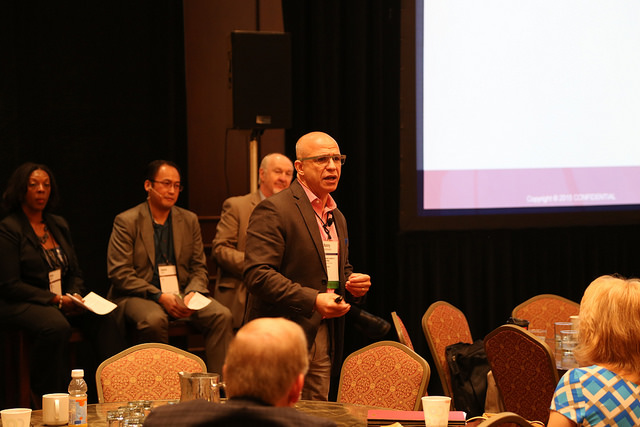For most employers, diversity and disability hiring are often thought of as separate initiatives, but despite the differences of disclosure and accommodation, disability simply is diversity. In fact, people with disabilities make up the largest minority group in the United States at 20% of the population – that’s 56 million people comprised of all demographic segments. Many of these individuals will go to college and enter the workforce with the simple goal of being considered by employers based on their abilities rather than their disabilities.
At DirectEmployers 2015 Annual Meeting & Conference (DEAM15) this past spring, attendees had the opportunity to listen to an insightful panel discussion on the topic of hiring students with disabilities. This session was comprised of four industry experts who each brought a unique perspective to the conversation: Howard Green of the National Organization on Disability (NOD), Manny Contomanolis of Rochester Institute of Technology, Jason Capili of PricewaterhouseCoopers, and Alicia Wallace of Anthem.
Howard Green kicked off the conversation by going over some of the key issues that inhibit the relationship between employers, colleges and students with disabilities including the lack of training for hiring managers, disconnects between college career and disability offices, and confusion regarding OFCCP Section 503 regulations. NOD acts to combat these issues and ultimately improve employment opportunities and outcomes for students with disabilities. One such way they’re doing this is through their Disability Employment Tracker – a tool that provides an assessment of your organization’s disability efforts, benchmarks you against other employers and suggests best practices for areas of improvement.

Manny Contomanolis of Rochester Institute of Technology presenting at DEAM15.
Manny Contomanolis went on to share that there are more students with disabilities enrolling in college than ever before. To accommodate this rise in enrollment, his recommended best practice for universities is to establish a close relationship between career centers and disability services. The goal of this relationship is to establish a pipeline of students who disclose a disability, to which employers can share their open positions and establish themselves as a disability-friendly organization. This further paves the way for employers to establish disability hiring programs, provide necessary training to their hiring managers on etiquette and accommodations, and simplify the hiring process for these students.
After exploring the institutional side of the conversation, Jason Capili and Alicia Wallace spoke to the employer perspective by sharing insight into their organization’s disability strategies and success stories. Jason explained that PricewaterhouseCoopers disability strategy has three important pieces: management training, establishment of a pipeline and internships. Alicia also discussed Anthem’s many initiatives including the creation of a disability toolkit and special training for hiring managers surrounding people with disabilities.
The panelists wrapped up by stressing the importance of having a conversation about disability with the entire hiring team to ensure that everyone is committed, and ended the discussion with these three suggestions for creating a more inclusive workplace: think differently, be deliberate and be dedicated. If you are a DirectEmployers Member interested in additional disability hiring resources, log into our community to view exclusive tools, discussions and presentations surrounding this important topic. Or, hear over 2 days worth of informative sessions like this one at the DirectEmployers 2016 Annual Meeting & Conference.
